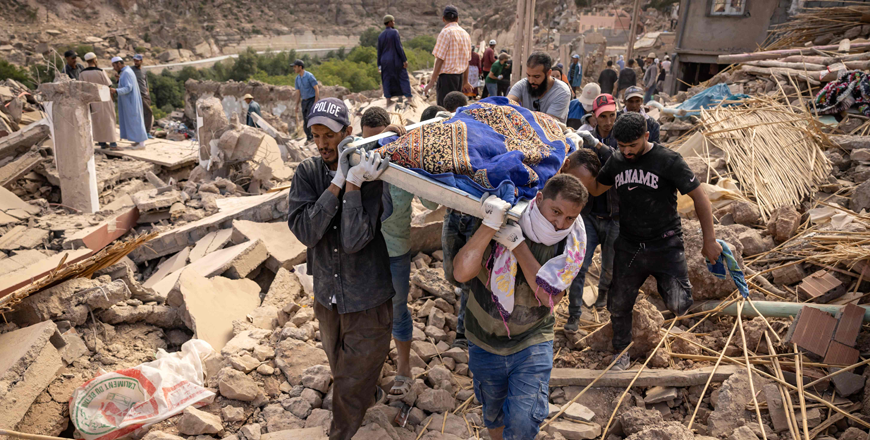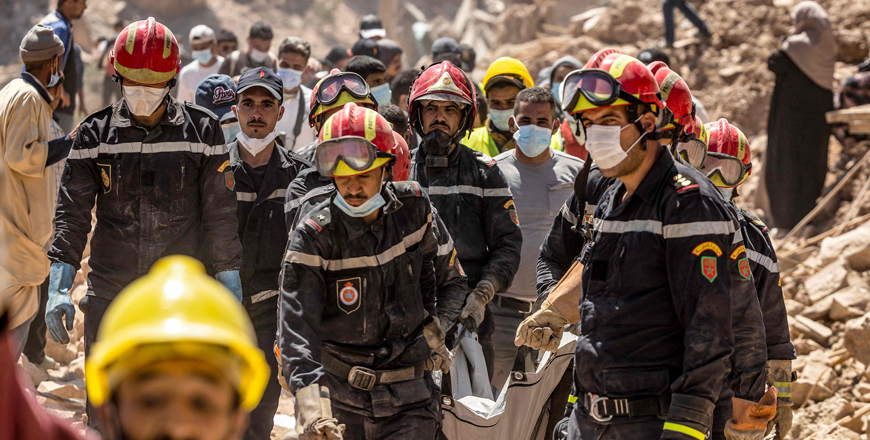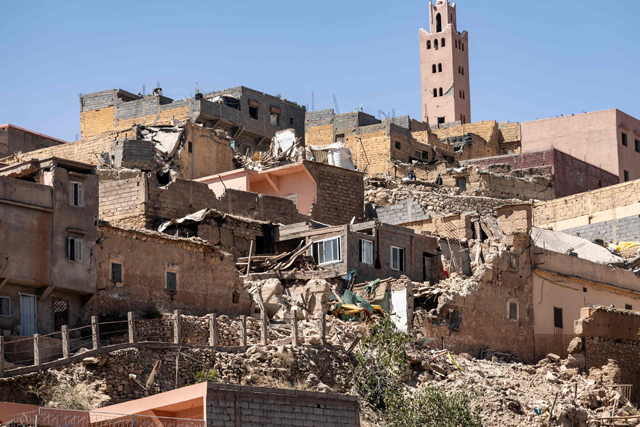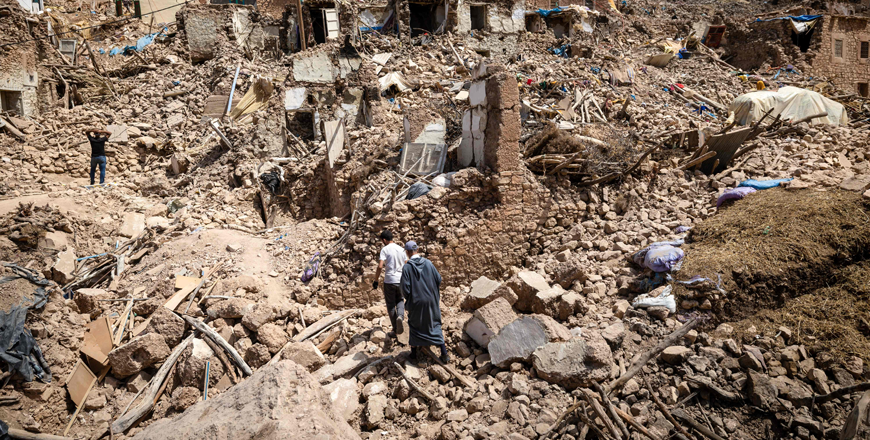You are here
Foreign rescuers join Morocco quake race against time
By AFP - Sep 11,2023 - Last updated at Sep 11,2023

People carry the remains of a victim of the deadly 6.8-magnitude earthquake on Friday, in the village of Imi N'Tala near Amizmiz in central Morocco (AFP photo)
TIKHT, Morocco — Moroccan rescuers supported by newly-arrived foreigners on Monday faced an intensifying race against time to dig out any survivors from the rubble of mountain villages, on the third day after the country's strongest-ever earthquake.
The 6.8-magnitude quake struck the Atlas mountains late Friday southwest of the tourist centre of Marrakesh. It killed almost 2,500 people and injured a similar number, according to the latest official toll issued Monday.
Rabat on Sunday announced it had accepted aid offers from four nations, while many other countries have said they were willing to send assistance.
Authorities have responded favourably "at this stage" to offers from Spain, Britain, Qatar and the United Arab Emirates "to send search and rescue teams", the interior ministry said.
It noted the foreign teams were in contact with Moroccan authorities to coordinate efforts, and said only four offers had been accepted so far, arguing that "a lack of coordination could be counterproductive".
President Emmanuel Macron said France was willing to provide aid "the second" Morocco requested it.
"Morocco is a sovereign country and it's up to it to organise the aid," French Foreign Minister Catherine Colonna told BFMTV on Monday.
She announced the release of 5 million euros ($5.4 million) to help non-governmental groups already on the ground in Morocco
'The village is dead'
A Qatari aid flight left from Al Udeid air base outside Doha on Sunday evening, said an AFP journalist aboard the plane which carried rescue vehicles and other assistance.
Spain has sent 86 rescuers and eight search dogs to the north African country to "help in the search and rescue of survivors of the devastating earthquake suffered in our neighbouring country", said a defence ministry statement.
"We will send whatever is needed because everyone knows that these first hours are key, especially if there are people buried under rubble," Spanish Defence Minister Margarita Robles told public television.
The earthquake wiped out entire villages in the foothills of the Atlas mountains, where civilian rescuers and members of Morocco’s armed forces have searched for survivors and the bodies of the dead.
Many houses in remote mountain villages were built from mud bricks.
While the foreign teams begin to arrive, Moroccan authorities have erected emergency shelters. Bright yellow tents were visible along the road into Tikht, a village which has effectively ceased to exist.
Members of the government’s civil protection service carried camp beds from a military-type truck toward the tents. Non-profit groups were also in the area to assess needs.
Previously home to at least 100 families, the quake left Tikht a tangle of timber, chunks of masonry as well as broken plates, shoes and the occasional intricately patterned rug.
“Life is finished here,” said Mohssin Aksum, 33, who had family in the settlement, where residents and their livestock were killed. “The village is dead.”
Blood donations
Citizens reported to hospitals in Marrakesh and elsewhere to donate blood for the injured. Among the donors were members of Morocco’s national football team.
Other volunteers organised food and essential goods to help quake victims, after complaints that authorities were slow to respond.
“Everyone must mobilise,” said one volunteer, Mohamed Belkaid, 65. “And that includes the authorities, but they seem to be absent.”
The education ministry announced that school classes were “suspended” in the worst-hit villages of Al Haouz province, the quake epicentre.
Some parts of Marrakesh’s historic medina and its network of alleyways saw significant damage, with mounds of rubble and crumpled buildings in the World Heritage site.
Dozens of people continued to sleep outdoors overnight in the modern quarter of Marrakesh. Some stretched out on the median strip of Mohamed VI Avenue. Others lay at the foot of their parked cars.
The United Nations Human Rights Council in Geneva began its session on Monday with a minute’s silence for the quake victims.
“We are part of a global collectivity: Humanity,” said Gambia’s ambassador Muhammadu Kah, who proposed the tribute.
The quake was the deadliest in Morocco since a 1960 earthquake destroyed Agadir, killing at least 12,000 people.
Related Articles
INEGHEDE, Morocco — Rescue teams stepped up a massive effort to bring relief to devastated Moroccan mountain villages Wednesday as the chanc
MOULAY BRAHIM, Morocco — Morocco's deadliest earthquake in decades has killed more than 1,000 people, authorities said Saturday, as troops a
MARRAKESH, Morocco — Hopes dimmed on Tuesday in Morocco's search for survivors, four days after a powerful earthquake killed more than 2,800



















